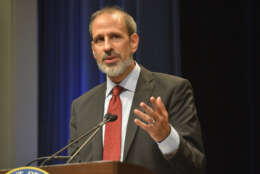Defense
-
Mike McCord, the undersecretary of defense (comptroller)/chief financial officer, said the Department of Defense will be impacted by more continuing resolutions, particularly if it leads to a sequestration, but it will not furlough personnel if that happens
November 16, 2023 -
As if pandemic, threats of nuclear war, and a lack of Tesla charging stations aren't enough to worry about, there is always the possibility that an asteroid could hit the earth and wipe-out all of us. A team at NASA discovered a way to alter the path of an asteroid, should one come too close and they garnered the distinction of being finalists in this year's Service to America Medals program, also known as the Sammies. For the details, Federal Drive Host Tom Temin talked with two members of NASA's Planetary Missions Program Office: Program Manager Brian Key and Mission Manager Scott Bellamy.
November 16, 2023 -
After rounds of FOIA requests and even litigation, the Project On Government Oversight (POGO) received a copy of the A-10C and F-35A close air support fly-off test report. The test was to compare how both aircraft stack up in providing all-important close air support to ground troops. After analyzing the heavily redacted document, POGO analysts found that despite what the Air Force had been saying, it appears the F-35 may not be well-suited for providing that support.
November 16, 2023 -
After a decade of constant change, DHA's new director says it's time to focus on delivering a truly integrated military health system.
November 16, 2023 -
If Congress ever passes the 2024 Defense authorization bill, keep your eye on Section 804. It's now in the Senate version, and it is aimed at granting the Defense Department the rights to increasing amounts contractors' data more than it appears DoD needs for maintenance and operation of what it buys. Section 804 seems innocuous at first glance.
November 15, 2023 -
In today's Federal Newscast: A Fort McNair Army civilian is guilty of charging thousands of dollars on a GSA gas card. A deputy archivist ends her federal service after more than three decades. And the Pentagon has a new responsible artificial intelligence toolkit.
November 15, 2023 -
The Air Force like many other agencies is awaiting Congressional funding to start new programs, but its quickstart initiative could help it begin with early phase, low-cost preliminary work while it waits for Congressional approval.
November 14, 2023 -
Maritime awareness starts with imagery generated by military, civilian federal and commercial satellites and other platforms. Planet, for example, provides federal agencies, among other customers, electro-optical imagery from its fleet of some 200 satellites.
November 14, 2023 -
In today's Federal Newscast: The Technology Modernization Fund Board awards $3.5 million to establish an online "lost and found” registry for unclaimed retirement benefits. A DoD official arrested last month for involvement in a dogfighting ring, has been replaced. And Kemba Walden will step down as acting National Cyber Director at the end of the week.
November 14, 2023 -
Military families are worried about how a government shutdown would affect them, including their paychecks, the impact it will have on food assistance programs like SNAP, childcare and medical services.
November 13, 2023 -
The Defense Department looks towards 5G and future G to help its warfighters make better decisions. At the same time, it is looking to improve the logistics, privacy, signature management, cloud security and cybersecurity of 5G.
November 09, 2023 -
Because of military aid to Ukraine and, presumably Israel, the U.S. defense industrial base is strained right now. Manufacturers of platforms and ammunition must deal with a list of regulatory and legal challenges. For more, Federal Drive Host Tom Temin spoke with attorney Justin Chiarodo, a partner at Blank Rome.
November 09, 2023 -
Ret. Vice Adm. Peter Neffenger, the former vice commandant of the Coast Guard, said the maritime intelligence fusion centers improve what service members can see when monitoring vessels.
November 09, 2023 -
The draft strategy is one way Space Force is working to develop standards for digital twins. It is also working on an open standard. Lisa Costa, the Space Force’s chief technology and innovation officer, noted that industry does not have a standard for digital twins that it could adopt.
November 08, 2023 -
The rule will include key details on the "most ambitious cybersecurity conformity initiative ever attempted,”
November 08, 2023
















